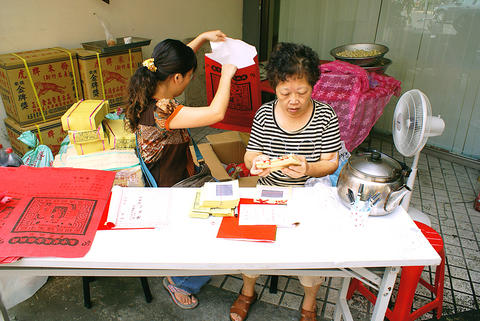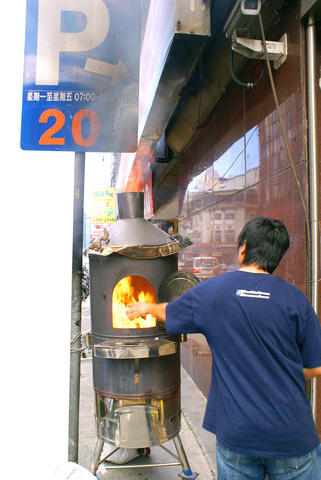Local authorities and environmentalists are hoping to lure hard-up ghosts to the suburbs with schemes to reduce the amount of pollution caused by the burning of "ghost money," paper made to resemble bills that is immolated as an offering to inhabitants of the netherworld.
Concerned that air pollution is reaching unhealthy levels in the capital, authorities in Taipei - and around the island - have introduced a variety of services to encourage residents to turn their backs on the centuries-old tradition of burning paper money in front of their businesses and homes, and show their respect by sending the bills to incinerators for immolation.
"Burning paper money causes pollution," said Huang Lu Ching-ju (黃呂錦茹), director of Taipei City Government's Department of Civil Affairs, the agency charged with promoting the schemes. "So we are finding ways to cooperate with religious groups to change this environmentally unfriendly folk custom."

PHOTO: NOAH BUCHAN, TAIPEI TIMES
Since 2000, the Department of Civil Affairs has been offering a free service for burning the paper money.
Known as "burning paper money collectively" (集中焚燒紙錢), authorities provide every borough in Taipei with 200 large red shopping-style paper bags that instruct residents to choose between offering money to gods (神明), ghosts (孤魂) or ancestors (祖先), and are stylized with traditional Chinese characters and motifs. Boroughs issue the bags to residents as needed, which are then filled with money and taken to incinerators in Mucha, Neihu and Beitou for burning. Each of the three incinerators has been ritually purified by a Taoist priest.
"It's easier to promote this kind of activity during Ghost Month because everyone is burning money," Huang Lu said.

PHOTO: NOAH BUCHAN, TAIPEI TIMES
Chinese tradition holds that the gates of the netherworld open once a year and ghosts roam the earth freely for 30 days. During this time, businesses place tables laden with food and drink in front of their premises to feed the hungry ghosts and burn money as a demonstration of their fealty.
"When the ghosts leave the spirit world they are hungry and need to be fed," said Chen Yung-te (陳永德) as he folded small sheets of paper money and added them to a small brazier in front of the investment company where he works. "That's why we have this table full of food. Burning paper money provides them with a bit of spending money."
Like many worshippers, Chen believes that the more paper money burned, the more content the wandering spirits will be and less likely to cause mischief for a business, which is believed to ensure a year of prosperity.
This year's Ghost Month began on Aug. 10. Though government agencies in Taiwan don't keep statistics on the amount of paper money purchased and burned throughout the year authorities are still concerned because burning "ghost money" releases benzene, a carcinogenic chemical compound that can damage eyes, skin and the central nervous system, into the air.
Breaking a long-held tradition, however, is proving difficult.
Walk down any Taipei street during Ghost Month, especially on the first and 15th day, which is known as Ghost Festival (中元節), and it's easy to see that many residents are ignoring the government's environmentally friendly overtures.
"It's inconvenient," said Hsieh Zhong-yi (謝忠毅), owner of a small restaurant in Shida. "We have to take the money to the incinerators ourselves."
Burning money at an incinerator, Hsieh said, doesn't provide the proper respect to ghosts because of its unclean connotations.
"People with a more traditional perspective still believe that for the ritual to be effective, they must burn money directly," said Wu Yung-meng (吳永猛), the Taoist priest who performed the purification rituals at all three incinerators.
Wu says it will take a tectonic shift in believers' attitudes and behavior before the amount of paper money burned is reduced.
"People were reluctant to use banks when they first opened," he said. "But gradually, as depositing money in banks became more common, people stopped questioning the practice and accepted it as a matter of habit."
And though Wu still oversees extravagant rituals that involve burning ghost money at Taipei's Paoan Temple (保安宮), he agrees that residents must reduce the amount of money they burn during Ghost Month and year round.
"This is a fundamental part of our culture," he said. "No matter what religious denomination, we ... see burning paper money as a way of respecting gods, ghosts and ancestors. So it will take a long time for people to change their habits."
Still, the government's policy seems to be making some headway. The amount of paper burned at the three incinerators in Neihu, Mucha and Beitou has increased from 83 tonnes in 2000, when the program was first introduced, to 636 tonnes last year.
In an alley off Roosevelt Road in Taipei, a borough leader oversees a group of volunteers who stuff paper money into the large paper bags. A woman sitting at a table collects donations - as much or as little as the worshipper wants to give - and jots down the name of people in a red book. At the end of the day, a truck from the Mucha incinerator will come by and pick up the bags.
"We've filled over 200 red bags," said a woman working at the table. When asked if worshipers are concerned that this method isn't devotional enough to please the ghosts, she says that she hadn't considered the issue before.
"We young people don't worry about those things," she said. "That's an issue that the older generation is concerned about."
For Huang Lu, it is a cause for celebration that members of the younger, more environmentally aware generation are unconcerned about strictly adhering to ritual.
"We think that appealing to students is most effective," she said. She added that this year alone authorities have spoken to 180,000 students about alternatives to burning money. "We hope that they will then go home and tell their parents."
Collecting and burning paper money at incinerators is part of a larger plan by the city government to gradually reduce and then eliminate the burning of paper money on festival days, and throughout the year.
"Like paper money, our ultimate goal is for residents to also stop burning incense," Lu said. "Putting your hands together [in prayer] is enough for the gods. The most important thing when worshipping is your sincerity. The gods will sense that."
Many temples throughout the capital have already jumped on the environmental bandwagon.
"Hsingtien Temple (行天宮) and Longshan Temple (龍山寺) no longer provide braziers to burn paper money," Huang Lu said.
Wu agreed that cutting down on burning ghost money is a sensible policy. "After all," he said, "people are the ones who created gods and ghosts, ... so there are other ways we can show our sincerity."

April 14 to April 20 In March 1947, Sising Katadrepan urged the government to drop the “high mountain people” (高山族) designation for Indigenous Taiwanese and refer to them as “Taiwan people” (台灣族). He considered the term derogatory, arguing that it made them sound like animals. The Taiwan Provincial Government agreed to stop using the term, stating that Indigenous Taiwanese suffered all sorts of discrimination and oppression under the Japanese and were forced to live in the mountains as outsiders to society. Now, under the new regime, they would be seen as equals, thus they should be henceforth

Last week, the the National Immigration Agency (NIA) told the legislature that more than 10,000 naturalized Taiwanese citizens from the People’s Republic of China (PRC) risked having their citizenship revoked if they failed to provide proof that they had renounced their Chinese household registration within the next three months. Renunciation is required under the Act Governing Relations Between the People of the Taiwan Area and the Mainland Area (臺灣地區與大陸地區人民關係條例), as amended in 2004, though it was only a legal requirement after 2000. Prior to that, it had been only an administrative requirement since the Nationality Act (國籍法) was established in

Three big changes have transformed the landscape of Taiwan’s local patronage factions: Increasing Democratic Progressive Party (DPP) involvement, rising new factions and the Chinese Nationalist Party’s (KMT) significantly weakened control. GREEN FACTIONS It is said that “south of the Zhuoshui River (濁水溪), there is no blue-green divide,” meaning that from Yunlin County south there is no difference between KMT and DPP politicians. This is not always true, but there is more than a grain of truth to it. Traditionally, DPP factions are viewed as national entities, with their primary function to secure plum positions in the party and government. This is not unusual

US President Donald Trump’s bid to take back control of the Panama Canal has put his counterpart Jose Raul Mulino in a difficult position and revived fears in the Central American country that US military bases will return. After Trump vowed to reclaim the interoceanic waterway from Chinese influence, US Defense Secretary Pete Hegseth signed an agreement with the Mulino administration last week for the US to deploy troops in areas adjacent to the canal. For more than two decades, after handing over control of the strategically vital waterway to Panama in 1999 and dismantling the bases that protected it, Washington has